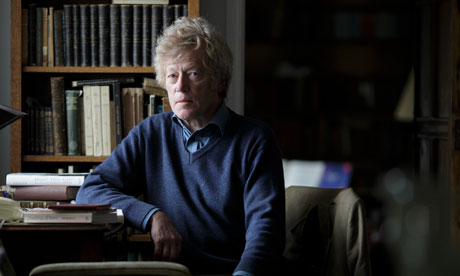 Roger Scruton in interview about the European intellectual elite, the Hungarian national identity and why the IMF agreement might diminish a part of sovereignty but can also be advantageous for Prime Minister Orbán. Mos Maiorum recently interviewed British philosopher Roger Scruton in Bercel, Hungary at the Common Sense Society’s 2012 Summer Leadership Academy.
Roger Scruton in interview about the European intellectual elite, the Hungarian national identity and why the IMF agreement might diminish a part of sovereignty but can also be advantageous for Prime Minister Orbán. Mos Maiorum recently interviewed British philosopher Roger Scruton in Bercel, Hungary at the Common Sense Society’s 2012 Summer Leadership Academy.
roger-scruton.com
Mos Maiorum: Professor Scruton, let us first talk about the recent political events in Hungary and Europe. I don’t know how well you are acquainted with the Hungarian situation, but you might have heard the news that an IMF delegation recently came to Hungary to prepare talks about some sort of an agreement and financial support for the Hungarian budget. Do you regard it as a danger for a government’s financial policy and sovereignty to take this sort of help, or can there be situations when it is useful?
Roger Scruton: Well, all help of this kind diminishes sovereignty. Because you become answerable to the international body about the use of your own budget. We have seen proof of this in the case of Greece. Greece has essentially lost economic sovereignty and it will not be able to regain it except if it withdraws from the Eurozone now. In the Hungarian case, too, it is undeniably true that there will be some loss of sovereignty in that the government and future governments will have to comply with the conditions of the loan, which may involve making decisions about taxes and about the disposition of economic growth and so on. This same phenomenon we can confront in our own lives as well: if one accepts a mortgage, a loan from a bank to buy a house, the structure of one’s whole life will be changed. But we accept it because we assume that nevertheless the change is for the better. Let us say the good consequences outweigh the bad.
MM: Will the good outweigh the bad in the Hungarian case?
RS: I think that he Hungarian government hopes for the same positive balance from an agreement with the IMF. Although I have to say I never understood how this institution works, and I don’t think the people who run the IMF understand how it works particularly, because none of them seem to be trained in anything except politics.
MM: What do you think of Mr. Orbán’s international manoeuvring in general? He has many adversaries and opponents in Europe, including in the European Parliament and in the media. Do you not think that to take an independent national stance is too risky in a situation like ours? Or do you agree with those who consider him an example for other countries looking to put their own national interest first?
RS: I would say that Mr. Orbán’s approach to the IMF is probably the right one. Hungary is in a difficult situation economically like all the countries in this region, and it needs short term help in order to achieve long term stability. Here is some short term help offered by the wrong kind of institution. But I think, Mr. Orbán’s approach is, as you say, to put the national interest first, and make sure as far as he can that the terms of the loan are such that the country will be able to pay it back by the time required.
MM: This achievement presupposes a rather delicate, nuanced way of negotiating.
RS: It is hard to know how far this is possible at all! One of the key questions is whether it will end up as a semi-permanent debt or a temporary one. Most people say that permanent debts in the end are in fact gifts, because effectively you are not paying it back. It is simply there in the background of all your dealings, and the person who gave the gift turns out to be the stupid one because he has lost the money. There is plenty of evidence that the IMF will in the long run function in that way. It will just be one way of transferring capital assets from one part of the global economy to another.
MM: Do you think that political prices will have to be paid for that?
RS: I am sure that is true. But that is where you have to be a clever politician to try and get the reward without paying too high a price for it.
MM: Because of Mr. Orbán’s manoeuvering there have been many anti-Hungarian reactions in Europe and elsewhere in the whole Western world. On the other hand, in certain countries, such as in Poland, Orbán is taken for a kind of hero. What sort of positive role might Orbán play in the present situation of the European and global crisis?
RS: I think that is a more interesting political question, really. Because the question about the IMF is not really to do with Mr. Orbán’s politics. There are plenty of countries presently appealing to the IMF and Hungary just happens to be one of them. When it comes to the European Union there are interesting issues which are peculiarly Hungarian. The European Union, as you know, is centred upon the alliance of France and Germany, and in particular on the German need to whitewash its past, to persuade the world that Germany is a civilised nation which has nothing to do with that Nazi episode.
MM: Does it not overplay this role?
RS: It does. Because the German political class is constantly looking for some right wing extremist governments to contrast itself with. And Hungary is a wonderful example, because first of all Germans imposed fascism on Hungary, and forced Hungary in a position which many people today feel ashamed of.
MM: It should be added that some Hungarian groups and even those in authority supported the evil Nazi German intention.
RS: Yes, that was a bad moment in Hungary’s past as well. Not as bad as the same moment in Germany’s past, but not something people now want to look back on. Orbán has been picked out by the political class in France and Germany and held up by the left wing media as a kind of symbol of the things that we are all against now.
MM: Are they right in that respect?
RS: Of course not. This description of him is a caricature of what he is. I think that he is a person who likes to centralise power in himself and his circle, but these instincts are perfectly human as far as I can see. He hasn’t done anything different from Mr. Blair in England or Mr. Obama in America in this respect. Yes, Obama, too, has centralised power radically in his presidency. But we are speaking about a cultural and even spiritual need in the leaders of the European class to have a kind of external enemy…
MM: A scapegoat?
RS: A scapegoat. And I think that it is a great pity for Hungarians that Hungary has been fitted into this role.
 guardian.co.uk
guardian.co.uk
MM: Do you think that there is something in Orbán’s behaviour that might have invited this perception even if he might not be the sort of person he is described to be? Perhaps he could have tackled these issues a bit more tactically and perhaps less vehemently…
RS: I am sure that is true. Nobody is perfect, anyway. In these fantasy-pictures of people there always needs to be some element of truth, otherwise nobody would believe them at all.
MM: As you see it, is he anti-European as such? We tend to speak about European values. Isn’t nationalism – the representation of national interest in the European Union – a general phenomenon in this part of the world? Or to ask it more provocatively, is it at odds with European values?
RS: This is the big question. My view is that the success of European civilization is entirely due to the nation state. That’s the great thing that we achieved. Which emancipated the people of Europe from religious domination and enabled people to build up areas of sovereignty. Which created loyalty of the people to the territory where they were. And the nation state also lent itself to the building of terribly complex things as the Austro-Hungarian Empire.
MM: Was it really something like a nation-state or rather a state of nations?
RS: In this part of the world you had a remarkable combination of national identity as the fundamental loyalty of the people and a transnational form of government centred in Vienna, and it worked remarkably well. But it was destroyed…
MM: By the nationalities. There were some of them who did not look at Vienna (or Budapest, for that matter) the way you do…
RS: Well, of course. That is why the First World War broke out. But going back to your question of European values, it’s undeniable that a sense of national identity is part of them.
MM: And why do some people deny that?
RS: Because of the German conscience. Because of the tainted German past. The German political class thinks about nationalism as something they has been transcended.
MM: Do you find some sort of a logical connection between nationalism and the pre-war German political situation?
RS: No…
MM: How far is nationalism acceptable as an ideology according to present day democratic standards? Is it not a slippery slope?
RS: Look at my country, England, which is part of the United Kingdom of four different nations! We have a strong national identity, but it does not involve nationalism as a belligerent creed, or anything like that. We simply say: here is a place, we belong to it, and we are going to defend it. And it has its traditions, its customs, its monarchy, and so on, and people love it all, and they are prepared to live together in acknowledging that shared love. So it is easy for us to accept changes of government and all the rest.
MM: Turning back to the European crisis. There is this argument that centralisation is an economic necessity. What do you think about this claim?
RS: Well, what do I think about that? I never accepted any argument, which begins from the premise that something is an economic necessity. There are no economic necessities. Economics is and ought to be the slave of politics. The first questions should be: what are we, to what do we belong, how do we want to live? Then of course we have to pay for what we are. But we pay for it, if we are sensible, by giving people the freedom to engage in economic enterprises, and that’s not the affair of the state, that’s the affair of the people.
MM: But surely, Europe is in a serious crisis. Is centralisation not politically necessary to avoid any further decline?
RS: The way I see the European crisis at the moment is that the invention of the Euro, and its imposition by France and Germany was a mistake, to try and achieve economic unity in that way through inventing a currency without making decisions as to who has the debts, the collective debts attached to that currency. And everybody knows this was a mistake, but apparently in the European Union there is no plan B, no conceptions about what to do in order to undo the mistake.
MM: Interestingly, Mos Maiorum talked a few weeks ago to your colleague in Oxford, John Finnis, the legal philosopher, and he also pointed out that at the very beginning of the story of the Euro bankers and lawyers were quite aware that it cannot work in this way.
RS: I know, I know. Like in the whole European project, there is an element of fantasy in the heart of the Euro story as well. A fantasy of the political class that has enormous advantages itself while there is no popular support.
MM: But how can you withdraw in a situation like this?
RS: The response of the European elite to all these difficulties is to say more Europe, more centralisation, when the mistake is exactly centralisation. And this means that it will go on until its total collapse. Why do people admire Orbán in Poland and elsewhere? Because his is the first voice to say here: look, this project has been imposed upon us, without consulting us. And all that we have as Hungarians is Hungarian national identity, and at least we can hold on to it. So why don’t we make that into a central feature of our political order, the thing that unites both left and right, unites people of different interests and different stages of life?
MM: Your description is also an idealisation. The left would say that this is not the right moment in history for nationalism…
RS: But of course the intellectual left has always identified itself outside the nation and in opposition to it, but not the ordinary left wing person working in a factory in Debrecen, or somewhere. For him it is still very important that he is Hungarian, and that’s his language, and his history, and his family, and so on. And that is true about Britain, too. We have an elite, an intellectual left which is internationalist. But the reason why people vote for the Labour Party is that they think of it as something fundamentally English.
MM: So you imply that the intellectual elite might have a responsibility in the present crisis?
RS: Well, the whole European project is a creation of the intellectual elite: the post-war reaction against the Nazis, and so on. It was an intellectual elite that deliberately worked in secret. People, like Jean Monnet and the people around him, Kojève as well, in France, who turns out to be a KGB agent. You know these people were secretly working to create a United States of Europe. They knew that the people would never accept it so it always had to be disguised as something else. It was introduced as a Coal and Steel Community, and all these absurd things…
MM: But politics is always about concealment, isn’t it? You cannot show real power, pure power as such to the people…
RS: Well, politics should not be about power only. There is a distinction between power and authority. A politician with real authority will automatically have the consent of the people. It is only when it is just pure power as it was under Communism that politics becomes an object of suspicion.
MM: Finally, at the moment we are participating in the Summer Leadership Academy organised by the Common Sense Society in Hungary. Why do you think it is still relevant to organize events like this one 22 years after the transition from Communism? It is also interesting to note that this Academy has a subtle underground taste as well – we are in a far-away provincial village, not in Budapest, at one of the state-run or private universities. Why do you take part in this venture?
RS: Me, because I am a great believer in private initiatives and in the growth of civil society. I do not think the state is competent really to guide people in the way the socialists would like, I think the universities on the whole have been corrupted by the state control, and that is why we need more private initiatives, and they should come from the people. I would rather think it a waste of my time to be part of a big state enterprise in Budapest, I think the way forward for Hungary–as for others–is for people to take their own destiny in their own hands, and they do this by getting together in small voluntary associations, like this one, and looking for leadership and guidance and trusting more their own conscience and their own moral sense.
MM: Do you find students taking part in this pilot project interested in the ideas you keep talking about?
RS: Oh, yes, they are totally.
MM: How do you explain that? After all, there are so many interesting things to do nowadays…
RS: I know, but ideas are interesting, too. And the most interesting facts about the ideas that I have just been exploring is that they are true. In a world full of lies and deceptions true thoughts have a kind of glamour.
The Hungarian translation will be done by Zsófia Göde.
Roger Vernon Scruton (born 27 February 1944) is a conservative English philosopher and writer. He is the author of over 30 books, including Art and Imagination (1974), Sexual Desire (1986), The Aesthetics of Music (1997), and A Political Philosophy: Arguments for Conservatism (2006). He has also written several novels and two operas.
Scruton was a lecturer and professor of aesthetics at Birkbeck College, London, from 1971 to 1992. In 1982 he helped found The Salisbury Review, a conservative political journal, which he edited for 18 years. Since 1992 he has held part-time positions at Boston University, the American Enterprise Institute in Washington, D.C., and the University of St Andrews. He also founded the Claridge Press in 1987, and sits on the editorial board of the British Journal of Aesthetics. He serves in addition as a member of the International Advisory Board of the Center for European Renewal. /source: Wikipedia/




